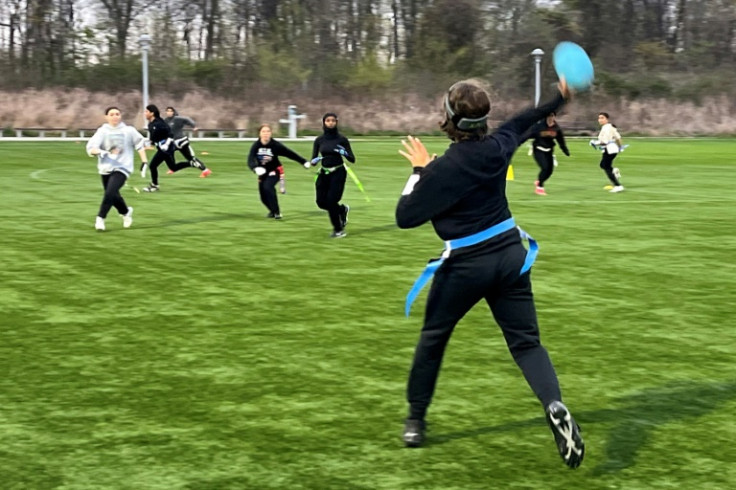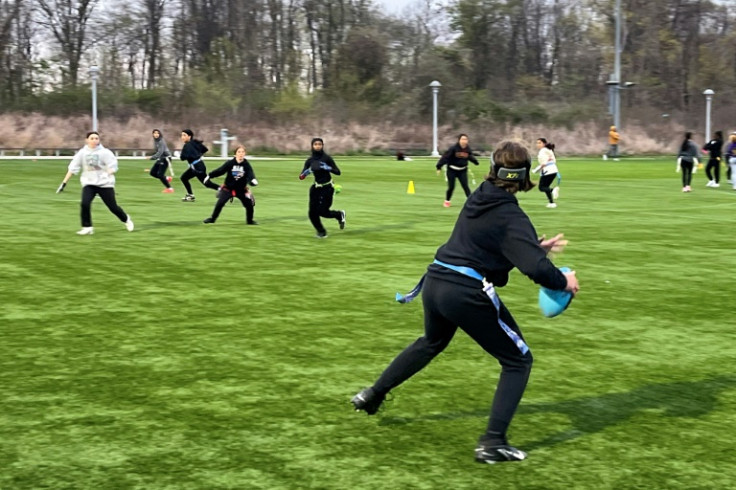Women's Flag Football Explodes In US As 2028 Olympics Beckon

Flag football, a non-contact version of American football, is spreading like wildfire among US girls drawn by the prospect of its inclusion in the 2028 Olympics, its popularity even sparking plans for a professional league.
"It's the youth version of pickleball, the fastest growing adult sport," says Michael Colt, comparing flag football to the racquet sport that's all the rage among the over-30s. "It's crazy."
Colt, 44, coaches the Staten Island Giants, last year's under-18 US champions.
Since he co-founded the club in 2019, its youth teams have earned a host of national titles and sent several players to the national team.
Colt said it had been "a struggle" early on to gain recognition and find backing.
"We fought for everything," he said. "We were kind of always pushed to the side, like this wasn't serious.
"And I see that about the sport to this day, when you're asking the difference in the sport. In the beginning, nobody really wanted to coach girls."
The Giants' trajectory mirrors that of the sport as a whole. Developed as an alternative to collision prone tackle football, girls' and women's flag was relatively unknown six years ago.
Yet particpation reached close to 270,000 girls aged six to 17 in 2024, according to the USA Football, which oversees US teams in tackle and flag football -- and Colt's Giants club has the financial backing of the NFL's New York Giants.
Even as the NFL throws its impressive weight behind the game, the scope of flag football can still come as a surprise to the uninitiated, especially the opportunity it provides for gridiron-loving girls.
When 14-year-old Brielle Caetano talks about flag, which she has been playing since kindergarten, people "are very in shock".
"And (then) I tell them you can get a (university) scholarship from that," Caetano added. "They're definitely in shock."
"Football has always been considered a boy's sport," noted 16-year-old Annie Falcone of the familiar high-contact game whose pinnacle is the NFL. "But flag football has grown so much for women of all ages."
In flag football, most often played in a five-on-five format, an offensive player is "tackled" by pulling one of two "flags" worn on a belt around the hips.
No blocking is allowed, further reducing the risk of injury in a game that focuses on running and throwing skills.
"It's just incredible to me how fast flag overall is growing, but really led by girls and women," said Scott Hallenbeck, USA Football's chief executive officer.
"In my probably 30-plus years of being involved in sports, I've never seen a discipline of a sport scale (up) as fast as we're seeing flag."
Hallenbeck said a lot of credit for that growth goes to the NFL, which is pushing to develop the game.
That includes at the youth level, with the NFL organizing its own national flag tournament for boys and girls in July this year, with sponsors and a TV broadcasting contract.
While the NFL is the most-watched pro league in the United States, it has struggled to expand the game outside US borders.
The NBA has become a global phenomenon, and elite basketball leagues prosper outside the USA. But tackle football has found a foothold in just a few other countries such as Germany and Mexico.
Hallenbeck said flag football could be an international game-changer.
"(They are) really pushing flag to help grow fandom and opportunities around the world and then obviously putting a lot of emphasis around it here in this country," he said.
Gaining inclusion at the 2028 Los Angeles Olympics is a key part of that campaign, and is already having an effect.
"It's a source of motivation for me and for the girls right now," Falcone said.
The NFL is already looking beyond the Games, and is "exploring very aggressively now an opportunity to create a professional flag league for both men and women, obviously two different leagues," NFL commissioner Roger Goodell said in February.
"They're trying to gather sponsors," said Colt. "I definitely think it's going to be a professional sport by 2032."

© Copyright AFP 2024. All rights reserved.





















